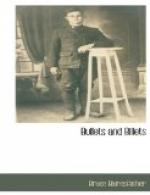I and my section had drawn up opposite what had once been an estaminet. I entered, and told them all to come in and stay there out of the rain. The roof still had a few tiles left on it, so the place was a little drier than the road outside. The floor was strewn with broken glass, chairs, and bottles. I got hold of a three-legged chair, and by balancing myself against one of the walls, tried to do a bit of a doze. I was precious near tired out now, from want of sleep and a surfeit of marching. I told my sergeant to wake me when the order came along, and then and there slept on that chair for twenty minutes, lulled off by the shrapnel bursting along the road outside. My sergeant woke me. “We are going on again, sir!” “Right oh!” I said, and left my three-legged chair. I shouted to the section to “fall in,” and followed on after the battalion up the road once more. After we had covered another horrible half-mile we halted again, but this time no houses were near. How it rained! A perfect deluge. I was wearing a greatcoat, and had all my equipment strapped on over the top. The men all had macintosh capes. We were all wet through and through, but nobody bothered a rap about that. Anyone trying to find a fresh discomfort for us now, that would make us wince, would have been hard put to it.
People will scarcely credit it, but times like these don’t dilute the tenacity or light-heartedness of our soldiers. You can hear a joke on these occasions, and hear the laughter at it too.
In the shattered estaminet we had just left, one of the men went behind the almost unrecognizable bar-counter, and operating an imaginary handle, asked a comrade, “And what’s yours, mate?”
Again we got the order to advance, and on we went. We were now nearing the village of Wieltj, about two miles from St. Jean, which we had passed. The ruined church we had seen was at St. Jean.
The road was now perfectly straight, bordered on either side by broken poplar trees, beyond which large flat fields lay under the mysterious darkness. As we went on we could see a faint, red glow ahead. This turned out to be Wieltj. All that was left of it, a smouldering ruin. Here and there the bodies of dead men lay about the road. At intervals I could discern the stiffened shapes of corpses in the ditches which bordered the road. We went through Wieltj without stopping. Passing out at the other side we proceeded up this awful, shell-torn road, towards a slight hill, at the base of which we stopped. Now came my final orders. “Come on at once, follow up the battalion, who, with the brigade, are about to attack.”




